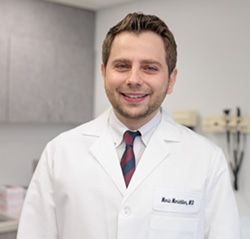
Meric Mericliler, MD, has joined the George Washington (GW) University Cancer Center and the GW Medical Faculty Associates as a hematologist-oncologist specializing in benign hematology.
"I am delighted to join the exceptional team at the GW Cancer Center," said Mericliler. "This is an incredible opportunity to collaborate with dedicated professionals and provide innovative, compassionate care to patients. I look forward to contributing to the center's mission of advancing treatment and improving outcomes for those facing hematologic conditions."
Dr. Mericliler brings extensive expertise to the role, including the management of anemia, clotting disorders, and other non-malignant blood conditions, enhancing the GW Cancer Center's ability to deliver comprehensive and personalized patient care. Known for a patient-centered approach and dedication to advancing treatments, he will play a pivotal role in the center's multidisciplinary care team.
"We are excited to welcome Dr. Mericliler to the GW Cancer Center," said Julie Bauman, MD, MPH, Dr. Cyrus Katzen Family Director of the GW Cancer Center. "His expertise in hematology aligns with our mission to deliver cutting-edge treatments, conduct innovative research, and provide compassionate care for our patients."
Dr. Mericliler earned his medical degree from Acibadem University School of Medicine, Istanbul, Turkey and completed his internship and residency at St. Elizabeth’s Medical Center in Boston, followed by a Hematology and Medical Oncology Fellowship at Virginia Commonwealth University Health System. His current research activities focus on gene therapies in the treatment of hemophilia.
"Joining the GW Cancer Center is an incredible honor, and I am excited to contribute to its long tradition of excellence in patient care, research, and education," said Mericliler. "I look forward to working alongside this talented team to make a meaningful difference in the lives of our patients and their families."



